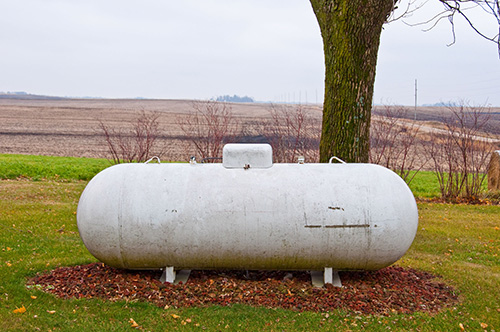Safety
One of the Council’s main charges – and probably the principal reason this Council was approved by the Oklahoma Legislature – is to coordinate safety activities. The Council’s safety programs range from training and education for propane marketers and employees to materials that encourage the safe use of propane for consumers. One such activity is the regulator rebate program. This Council was the first agency in the country to offer a regulator rebate. The Council provides $75 to help replace any out-of-date or faulty regulator. Although propane accidents are rare, faulty regulators are often the cause. Since 1997, the Commission has provided over 50,000 regulator rebates equaling more than $2 Million.
The latest propane safety advisory comes in the form of a brochure produced by the Propane Education and Research Council and made available at no cost by the Oklahoma Propane Education and Safety Council. The 8-panel brochure folds to fit inside a #10 envelope and includes important safety information including a scratch and sniff feature designed to familiarize customers with the smell of propane. Customers and marketers can order copies of the brochure by contacting the Council or by using the order form available on this website.
Don’t Get Caught Out of Gas
 Another safety program features the Council’s “Don’t Get Caught Out of Gas” brochures. This brochure explains how to read your propane tank gauge and encourages customers not to run out of gas. Out-of-gas calls are not only inconvenient, since a safety check must be conducted, it is also dangerous. Since 1997, the Council has distributed through propane marketers more than 450,000 out-of-gas brochures free of charge.
Another safety program features the Council’s “Don’t Get Caught Out of Gas” brochures. This brochure explains how to read your propane tank gauge and encourages customers not to run out of gas. Out-of-gas calls are not only inconvenient, since a safety check must be conducted, it is also dangerous. Since 1997, the Council has distributed through propane marketers more than 450,000 out-of-gas brochures free of charge.
 You’ve learned to keep a close eye on your car’s gas gauge. Running out of gasoline is not just an inconvenience, it could place you and your loved ones at risk. You watch the gauge and fill your tank to avoid being stranded. What you might not know is that you should also watch the gauge on your propane tank at home.
You’ve learned to keep a close eye on your car’s gas gauge. Running out of gasoline is not just an inconvenience, it could place you and your loved ones at risk. You watch the gauge and fill your tank to avoid being stranded. What you might not know is that you should also watch the gauge on your propane tank at home.
Did you know?
The State of Oklahoma has adopted the National Fire Protection Association’s requirements regarding out-of-gas situations. These regulations require anyone delivering propane to an out-of-gas customer or new customer to perform a complete system check. This leak or safety check includes an inspection of all lines, appliances, regulators and control valves. A thorough safety check can take as long as an hour to complete and most dealers will charge an additional fee for this service. It may be inconvenient, but the propane customer is required to be home at the time of the inspection.
Why is this inspection necessary on out-of-gas calls?
Propane is an extremely safe energy source when used properly. These strict out-of-gas regulations were enacted by The State of Oklahoma and NFPA to protect your family and property. Convenience, comfort, cost and safety… these are four good reasons to avoid out-of-gas situations.
We’re here to help.
Your propane dealer wants to make sure that you always have all the heat you need and plenty of hot water. That means making sure that you never run out of propane. You can avoid the inconvenience and cost of an out-of-gas call. Tips for reading the gauge on your propane tank have been included on this page. Just remember to call your propane dealer and have your tank filled before it reaches the one-quarter level. Or better yet, ask your dealer to place your account on an automatic fill basis. That way, your dealer will make sure your propane tank is filled year-round.
How to Answer 6 Common Propane Safety Questions
If you’ve ever had pushback from a client about the use of propane systems in their home, chances are it was because of safety.
When homeowners have a perception that propane is less safe than other sources of energy, it usually comes from a lack of information or experience. Maybe they’ve seen a movie where the good guy shoots a propane tank to cause an explosion or they’ve seen incidents on the news in which a do-it-yourselfer caused an accident installing or servicing their own appliance.
These safety concerns are important because any information you provide about the performance or efficiency benefits of propane systems isn’t going to make a difference if your customers don’t feel safe and comfortable with propane fueling their home.
Propane tanks are very robustly constructed and designed to withstand collisions of all kinds.
Below are six common questions about propane safety that building professionals get from customers, along with recommendations from Lyndon Rickards, director of safety and compliance for the Propane Education & Research Council, on the facts you can provide to reassure them. By addressing these questions head on, you can stay on track for a project that performs better and more efficiently with propane.
Is my propane tank going to explode?
Action movie special effects might leave your customer with the impression that a propane tank can explode just from an impact like a falling tree branch or being hit by a vehicle. But the truth is that propane tanks are very robustly constructed, made of heavy steel, designed to withstand collisions of all kinds, and meet all federal safety standards. Causing a propane tank to explode would be extremely difficult under any circumstances. If an action star needs to cause an explosion in real life, they’d be better off trying something else.
What happens if there’s a gas leak?
Your customer may not realize propane is very similar to the natural gas used more commonly in homes throughout the U.S. Homes fueled by natural gas and propane use similar equipment, and the chances of a fire caused by either type of fuel are statistically much lower than one caused by electrical equipment.
While it’s unlikely homeowners would ever encounter a problem, safety experts recommend customers consider installing both gas detectors and carbon monoxide detectors as a preventive measure. Installing these systems — which are often required by local code — can reduce the likelihood of an incident even further.
If your customer does suspect a leak, they should immediately follow these safety steps.
It’s also worth noting that in the unlikely event of a leak, propane is released in the form of a vapor, so it won’t cause a spill or contaminate soil. Fuel oil spills, on the other hand, can cause contamination of ground soil and require extremely costly emergency cleanup.
Do gas appliances harm indoor air quality?
Let your customers know that their propane systems are properly vented to exhaust their combustion air out of the home.
As a construction pro, you’re well-versed on the need to properly ventilate gas appliances. But your customers may have concerns about gas combustion in their home. This is a great opportunity to talk about the steps you take as a professional to ensure that appliances designed to be vented are properly installed and homes are free of combustion byproducts. Direct-vent gas systems have become much more common and inexpensive in recent years, taking the hassle out of venting. In fact, we’ve compiled “8 facts about venting tankless water heaters“ to highlight a few of these venting opportunities.
What happens to propane in a wildfire?
Just like propane tanks won’t explode due to an impact, they’re also built with safety features to withstand short-term wildfires. Propane tanks allow plenty of room for the liquid propane inside to expand in the heat, and a grass fire won’t provide enough sustained heat to cause pressure concerns. However, in the event of prolonged heat exposure, propane tanks are also built with pressure-relief valves that will automatically activate to let out propane vapor if pressure builds up to a critical stage.
What happens to propane in a hurricane or flood?
In a flood scenario, it’s not the propane tank itself that’s vulnerable but its connection to a home’s gas piping. Propane tanks can float, so if they’re pulled away from a home, it could cause damage to the gas piping system. That’s why homes that are built in flood plain zones have additional code requirements for strapping down propane tanks to ensure they remain in place. Emphasize to your customers that professional propane installation is vital. The local propane provider has the required training and awareness of local codes and requirements to ensure the home’s system is installed and operates in the safest manner.
What can I do to minimize risk?
Let your customers know you’re following all code recommendations and guidelines, such as keeping propane tanks away from combustible materials and protecting propane systems from vehicles. If it makes sense for your project, installing the propane tank underground minimizes exposure to weather-related issues, although they should still be strapped down in flood-prone areas. Most importantly, leave installation and repair work to the professionals. Tell your customers that trying to save money with a DIY project just isn’t worth the risk.
Making your project a success
While helping your customers become more comfortable with propane safety is critical, don’t let propane’s benefits get lost in the discussion. Customers love the ambience and convenience of gas fireplaces, the control of propane cooking, the warm comfort of propane heating, and the on-demand performance of gas tankless water heaters. Including propane in your homes increases the value of your projects and sets them apart from the competition. Having the propane safety conversation ensures your customers are open to hearing about those benefits — and are more likely to be thrilled with their new home.

